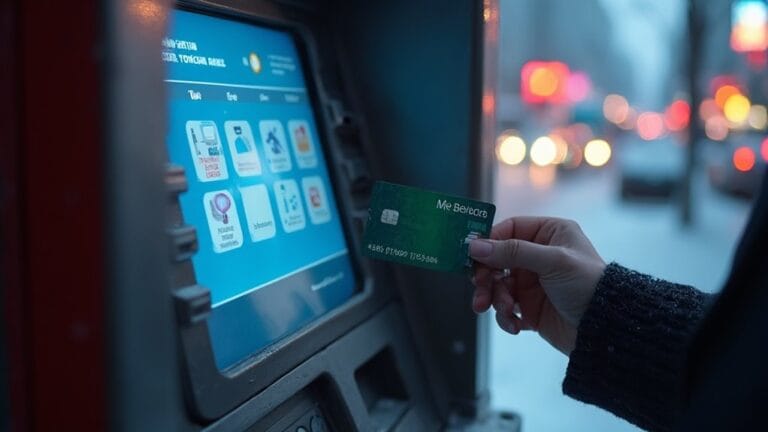For seamless US-Canada banking, you'll want to evaluate RBC Bank, BMO Harris, TD Bank, CIBC, Charles Schwab, Capital One 360, and HSBC. RBC shines with instant transfers up to $25,000 USD and no first-year fees, while BMO Harris offers impressive $50,000 wire limits. TD Bank and CIBC provide essential credit-building options, and Charles Schwab reimburses all ATM fees worldwide. Capital One 360 stands out with zero foreign transaction fees, and HSBC offers the lowest exchange rate markup at 2.40%. Looking closer at each bank's unique perks will help you maximize your cross-border banking experience.
Key Takeaways
- RBC Bank offers instant transfers up to $25,000 USD and cross-border accounts with no foreign transaction fees for seamless U.S.-Canada banking.
- BMO Harris allows phone-based account opening without requiring a Canadian account and provides fee-free transfers up to $50,000 USD.
- TD Bank and CIBC operate extensively in both countries, offering credit card options specifically designed to build U.S. credit history.
- Charles Schwab Bank and Capital One 360 provide unlimited ATM fee reimbursements, making them excellent choices for frequent border crossers.
- HSBC offers the most competitive exchange rate at 2.40% markup and favorable terms for travelers maintaining significant deposits.
Canadian Banks Operating Stateside
In light of increased cross-border mobility, several major Canadian banks have established significant operations in the United States. You'll find familiar names like BMO Harris, TD Bank, and CIBC offering services that'll make your cross-border life much easier. These banks provide essential credit card options to help build your U.S. credit history.
Looking for hassle-free banking? BMO Harris might be your best bet, as you won't need a Canadian account to get started. They'll even let you open an account by phone – how's that for convenience? If you're already banking with CIBC in Canada, their U.S. operation offers seamless transfers between accounts, and you'll love their Apple Pay compatibility. RBC Georgia's especially helpful if you're seeking mortgages or loans, and their staff really knows their stuff when it comes to explaining U.S. banking quirks.
TD Bank's particularly impressive with their variety of checking accounts – from Simple to Premier – and you won't always need to maintain a minimum balance. While Desjardins Florida and NatBank are also in the game, they're keeping their cards closer to the chest when it comes to specific offerings. Remember, most of these banks don't require a U.S. Social Security Number, making your conversion smoother than a hockey rink after the Zamboni!
Cross Border Transfer Costs

Wondering how much it'll cost to move your money across the border? You've got several options that won't break the bank, especially if you're working with specific financial institutions.
If you're an RBC customer, you're in luck! They offer free, instant transfers between their U.S. and Canadian accounts, with generous limits up to $25,000 USD per transaction. BMO's got a similar sweet deal – their Canada Wire service lets you move up to $50,000 USD from BMO U.S. to BMO Canada U.S. dollar accounts without fees. That's like finding money in your winter coat pocket, but better!
For those who don't bank with these institutions, there's always Western Union, though you'll want to watch those variable fees. Their user-friendly mobile app makes transferring money a breeze. While they offer impressive limits – up to $50,000 USD online and $7,500 USD at agent locations – the costs can add up faster than Canadian geese heading south for winter. You'll need to factor in exchange rates and transfer methods, which can make your wallet a bit lighter. Pro tip: compare rates across different days of the week, as they tend to fluctuate like prairie weather!
Exchange Rate Markups

Moving money across the border is one thing, but understanding exchange rate markups can make a huge difference to your wallet. When you're dealing with traditional banks, you'll find their markups can take a surprisingly big bite out of your funds – we're talking anywhere from 2.40% to 3.50% of your money vanishing into thin air! Of all the major banks, HSBC currently offers the most competitive rate at 2.40%, while Scotia's hefty 3.50% markup might make you think twice about using their services.
Here's the good news: you've got options that'll keep more money in your pocket. Services like Wise use the mid-market rate, which is basically the real exchange rate you'll see on Google, and CanAm Currency Exchange can save you up to 3% compared to traditional banks. If you're stuck with using a bank, consider special accounts like RBC's U.S. Premium Checking, which offers better rates than their standard service. Remember, when you're frequently crossing the border or sending money between countries, even a small difference in exchange rates can add up to significant savings over time! For Canadians needing regular transfers, RBC offers unlimited free transfers between Canadian and US accounts up to USD 25,000.
Monthly Account Service Fees
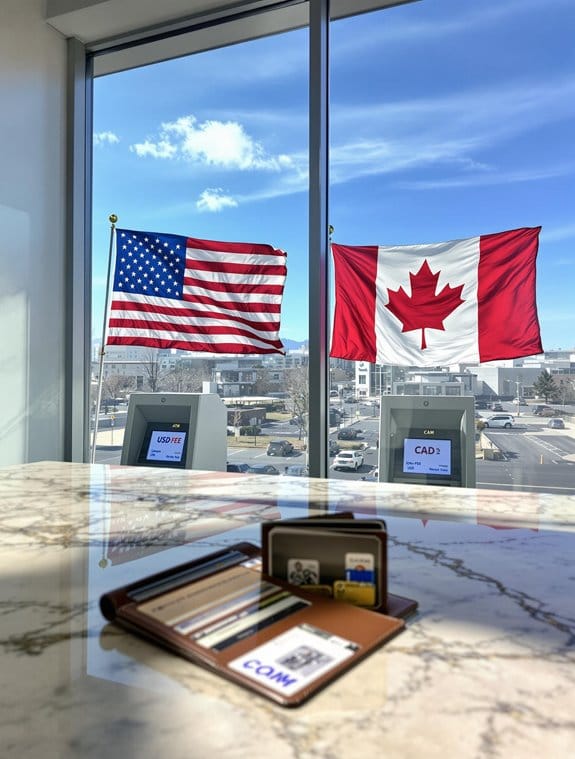
Three key factors affect your monthly service fees when banking across the US-Canada border: account type, minimum balance requirements, and the specific bank you choose. You'll want to look for accounts that won't eat away at your hard-earned money with unnecessary fees, especially if you're regularly crossing the border.
Here's some good news: Canadian regulations have pushed many banks to offer low-cost accounts with fees capped at just $4 monthly. RBC Bank, for instance, has a particularly sweet deal with their cross-border banking bundle – you won't pay any annual fees for the first year, and you'll get unlimited free transfers between countries. Talk about a border-hopping bargain! Payment processors typically charge transaction fees between 1.5% and 3.5% for international transfers.
When you're comparing accounts, don't just fixate on the monthly service fees, though. Think of it like shopping for a new phone plan – you've got to take into account the whole package. Look at foreign transaction fees, ATM withdrawal charges, and exchange rate markups. Some specialized cross-border accounts offer perks that'll save you money in the long run, like preferred exchange rates and fee-free ATM access across both countries.
ATM Network Coverage Fees
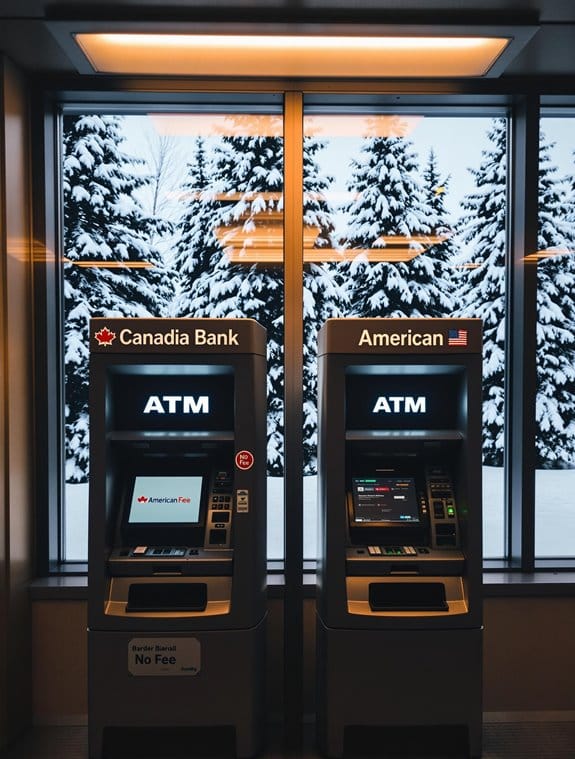
When it comes to ATM network coverage fees, you'll need to watch out for three distinct charges: regular account fees, network access fees, and convenience fees. Think of these like sneaky little tolls that pop up whenever you're trying to access your hard-earned cash across borders! Fee transparency is required by law when opening a bank account, so make sure to review all charges carefully.
If you're planning to bounce between the US and Canada, you'll want to pick your bank wisely. RBC Royal Bank, for instance, will hit you with fees ranging from $2.00 for Interac ATMs to a whopping $5.00 for international withdrawals – and that's not counting those pesky operator surcharges! But don't despair, there are some clever ways around this financial obstacle course.
Your best bet might be to go with banks that actually have your back when traveling. Charles Schwab Bank and Capital One 360 are like your financial guardian angels, offering unlimited ATM fee reimbursements and zero foreign transaction fees. For the frequent border-hopper, HSBC is particularly sweet if you've got some serious cash to park there. Just remember, choosing the right bank can mean the difference between keeping your money in your pocket or watching it disappear into ATM fees!
International Wire Transfer Charges
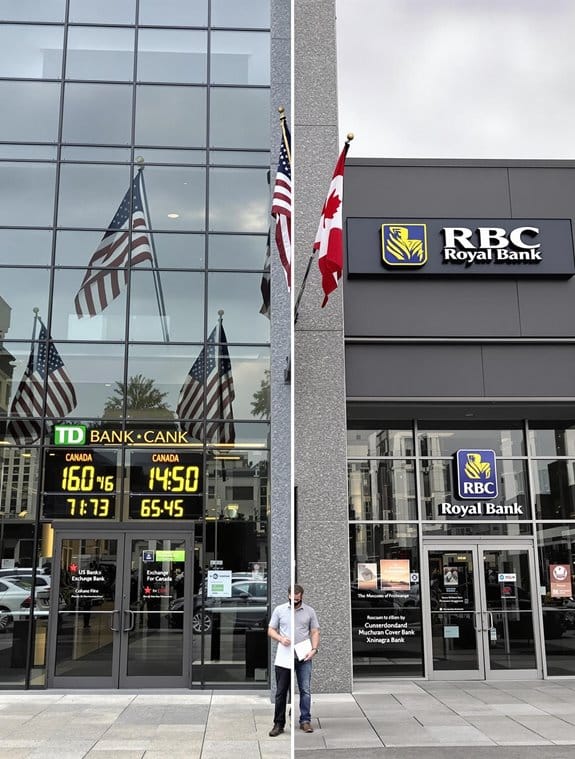
Beyond ATM fees, you'll want to get smart about international wire transfers if you're regularly sending money across the US-Canada border. BMO offers zero wire transfer fees from Canada, making it another excellent choice for cross-border banking. It's amazing how those fees can really add up if you're not careful, but there's good news for savvy travelers!
RBC Bank stands out as a fantastic option if you're frequently crossing the border. They've got this sweet deal where you won't pay any transfer fees between US and Canadian RBC accounts, and you can move up to $25,000 USD instantly – talk about convenience! On the flip side, CIBC charges anywhere from $30 to $80 for outgoing wire transfers, though they do offer their Global Money Transfer service without fees for amounts under $30,000.
Here's a pro tip: don't forget to factor in those sneaky exchange rates. Banks often make their money there, so you'll want to compare rates before pulling the trigger. And keep in mind that your recipient might face some charges on their end too. If you're planning to make regular cross-border transfers, RBC's Cross-Border Banking service might just be your new best friend – it's secure, easy, and best of all, fee-free!
Currency Conversion Fee Comparisons
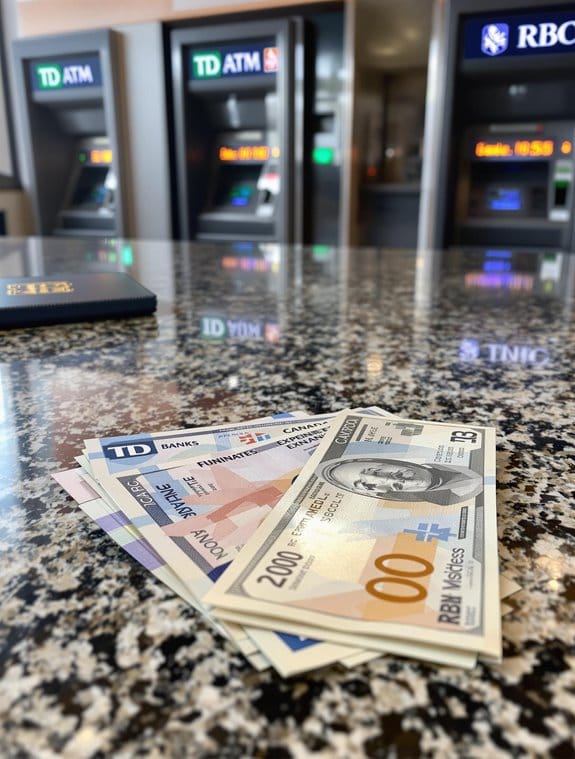
Understanding currency conversion fees can make a huge difference in your cross-border banking costs. You'll find that dynamic currency conversion, while convenient, often hits your wallet the hardest with poor exchange rates and sneaky fees. Instead, you're better off using your credit card's built-in conversion service, which typically offers more favorable rates. When exchanging at Ambassador Duty Free, keep in mind the daily limit of $2,000 per person for currency transactions.
When it comes to credit cards, each network handles fees differently. If you're using Visa, you'll face either a 1% base fee for USD transactions or a 1.40% enhanced fee for other currencies. Mastercard's slightly gentler, charging 0.60% for merchant currency transactions and 1% for local currency, while Amex keeps it simple with a flat 0.40% cross-border fee.
For the savviest solution, consider RBC Bank's cross-border accounts – you'll enjoy instant transfers between the U.S. and Canada without those pesky foreign transaction fees. And if you're planning to use ATMs frequently, Charles Schwab or USAA debit cards are your best friends, as they'll reimburse those annoying international ATM fees and won't charge you for foreign transactions.
Frequently Asked Questions
Can I Maintain My Canadian Credit Score While Banking in the US?
Like parallel universes, your Canadian and US credit scores exist independently. You'll maintain your Canadian score while banking in the US since they're separate systems that don't automatically share information between countries.
What Documents Are Needed for Opening Accounts if I'm Temporarily Working Remotely?
You'll need your passport, work permit, proof of address, employer documentation, and a temporary residence permit. Since you're working remotely, make sure to have digital copies of all documents for online applications.
Do Cross-Border Bank Accounts Affect My Tax Reporting Obligations?
With 97% of cross-border accounts requiring FBAR reporting, you'll need to declare foreign accounts exceeding $10,000. You're obligated to report worldwide income and file both U.S. and Canadian taxes when applicable.
Can I USe My Canadian Credit History to Qualify for US Loans?
Your Canadian credit history doesn't automatically transfer to the U.S., but some banks like RBC and BMO may consider it. You'll still need to build U.S. credit history for most American loans.
How Do Cross-Border Banking Services Handle Joint Accounts Between Countries?
While managing joint accounts across borders can be complex, you'll find BMO allows real-time transfers and linked account access. You're able to view all details through BMO Total Look, but both holders must meet cross-border criteria.




